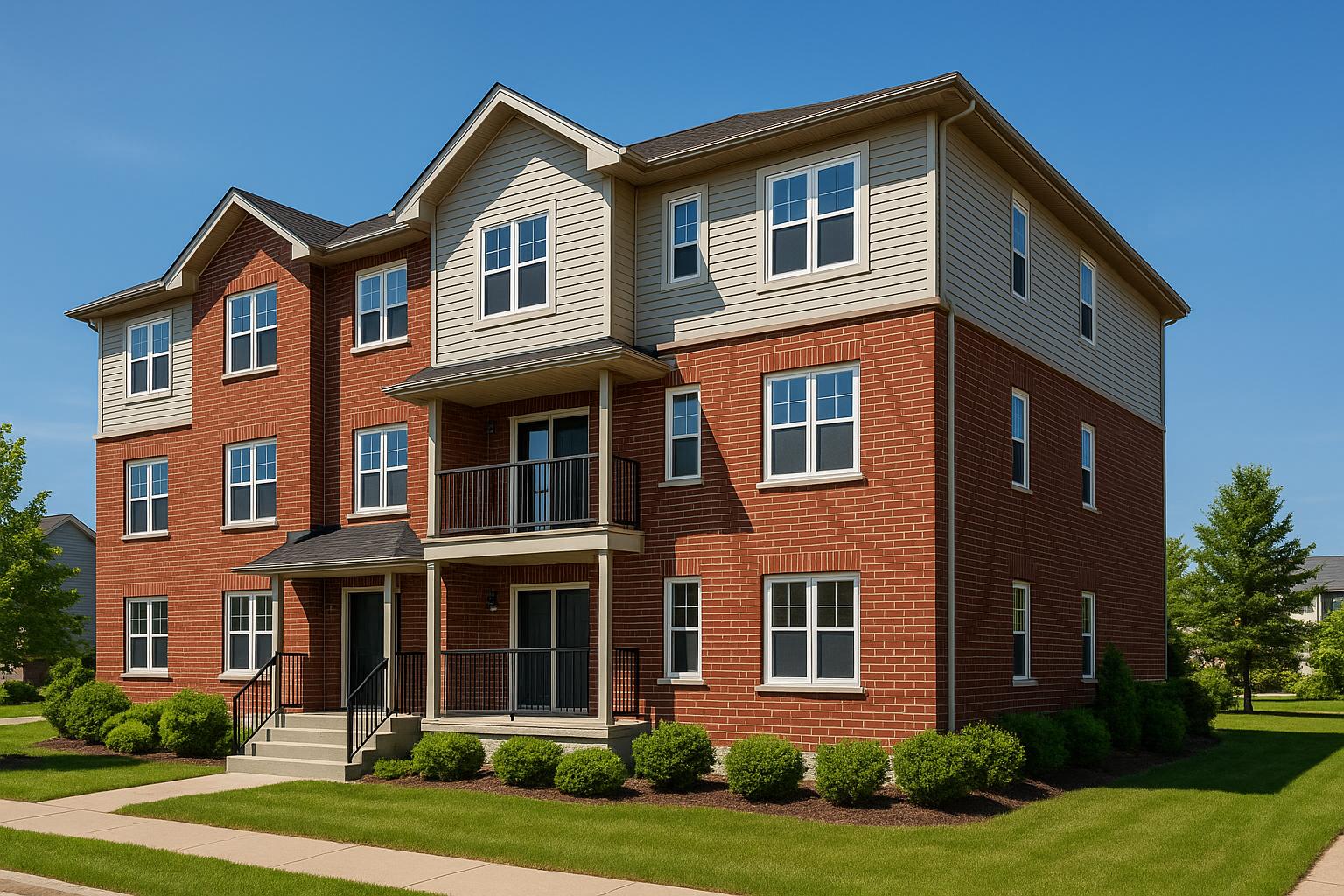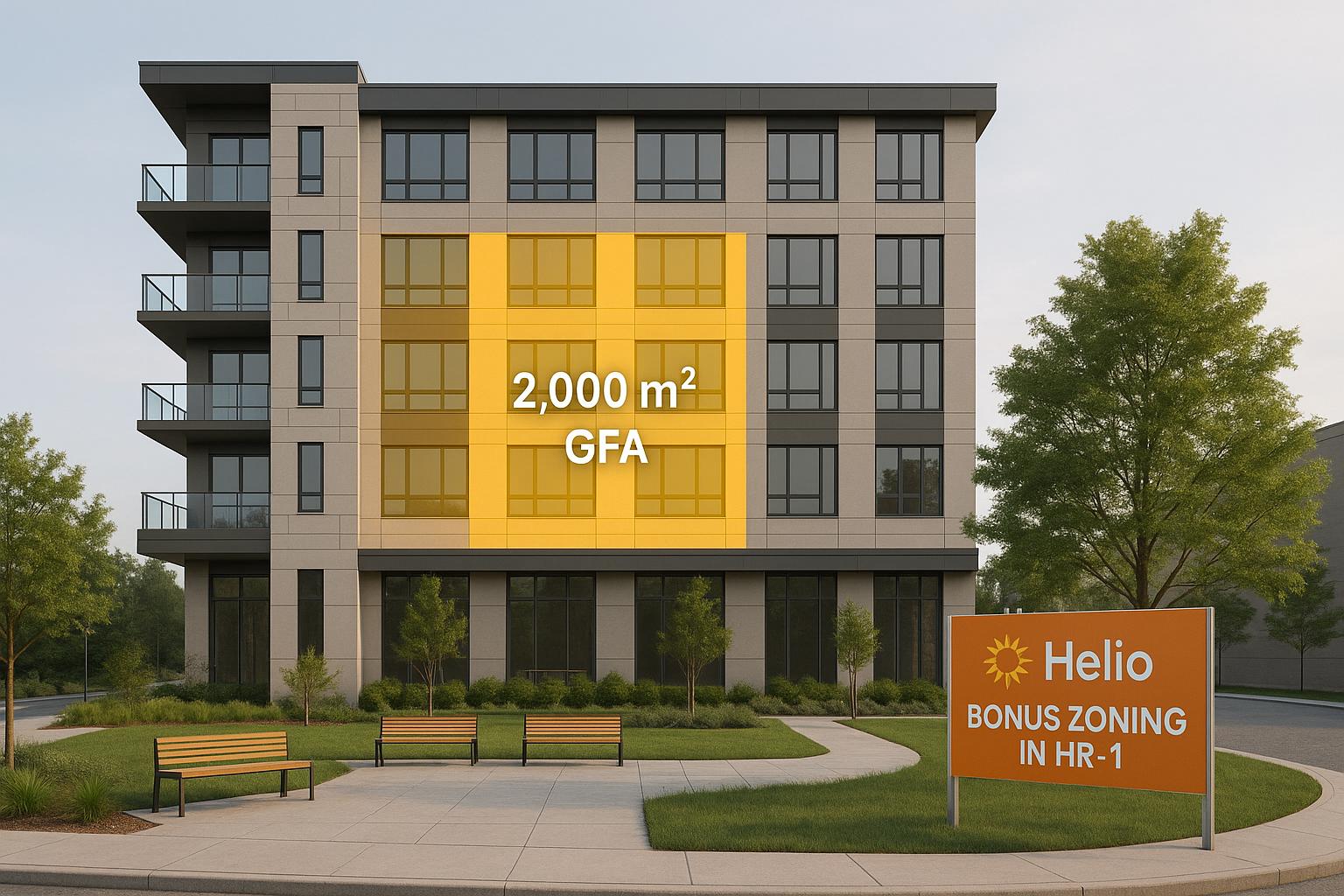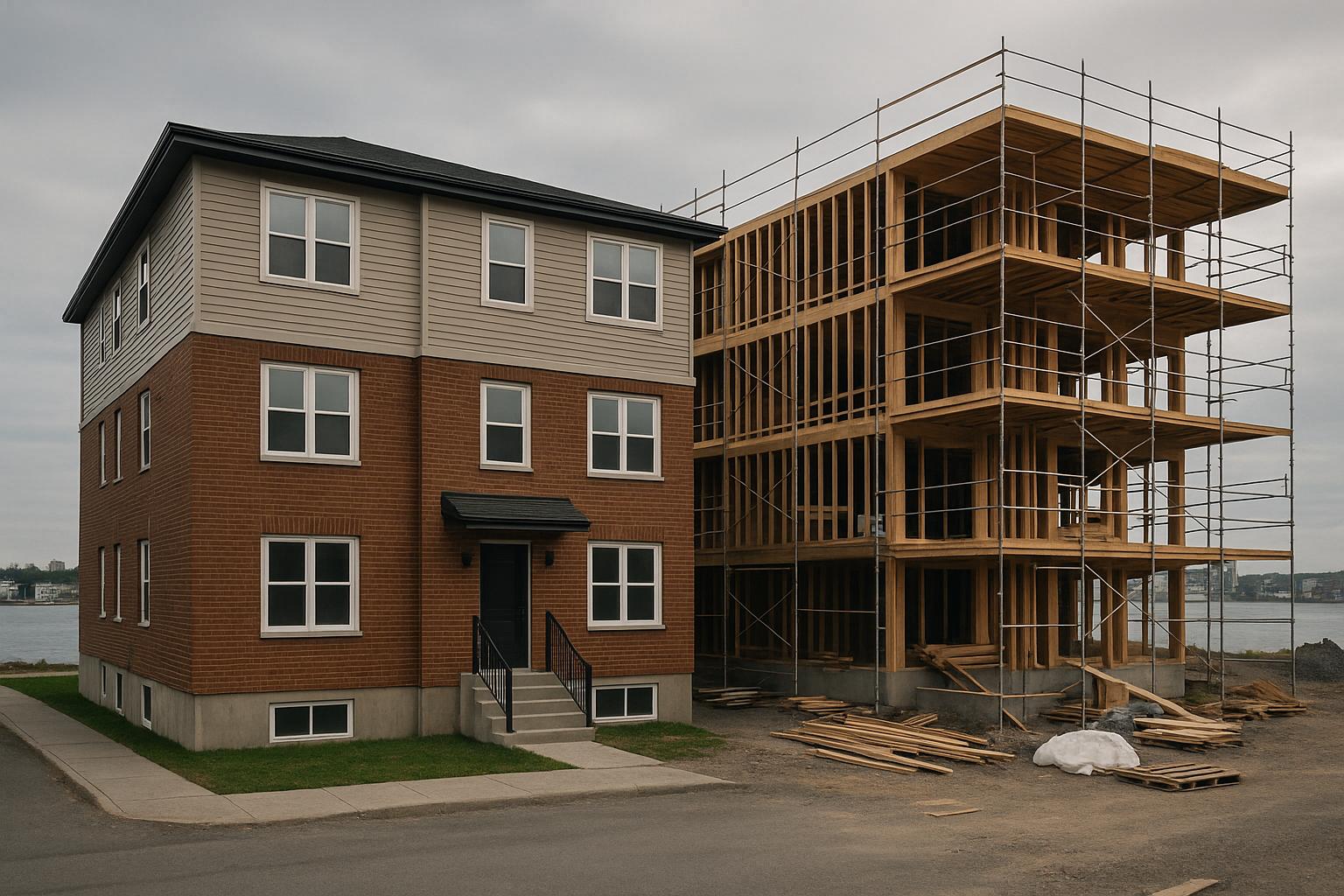Should you build or buy a home in Nova Scotia? Here's a quick breakdown to help you decide:
-
Building a Home:
- Costs start at $168/sq. ft. (fixed-price builds).
- Offers full customization, modern energy-efficient features, and potential equity gains.
- Example: A duplex built for $165/sq. ft. was appraised at $830,000, creating $231,000 in equity.
- Timeline: 7–10 months on average.
-
Buying an Existing Home:
- Faster move-in (1–2 months).
- Requires a 5–20% down payment.
- May involve immediate repairs or updates.
- Older homes often have higher maintenance and utility costs due to outdated systems.
Quick Comparison
| Priority | Building New | Buying Existing |
|---|---|---|
| Cost | $168/sq. ft. (fixed-price) | Varies by market |
| Timeline | 6–12 months | 1–2 months to close |
| Customization | Full control | Limited to renovations |
| Energy Efficiency | High | Often outdated systems |
| Equity Potential | Immediate | Dependent on market trends |
| Move-in Speed | Delayed | Immediate |
If you value customization, energy efficiency, and long-term equity, building might be for you. If speed and convenience matter more, buying could be a better fit.
Cost Analysis: Building vs Buying
New Construction Costs
In Nova Scotia, new construction costs typically start at $168 per square foot for fixed-price builds, though site-specific factors can influence the final cost. Here are two recent examples:
- A duplex in Colchester was completed at $165 per square foot, with a total investment of $599,000, including the site. The property was later appraised at $830,000, highlighting potential equity growth [1].
- In Halifax, a short-term rental property was built for $184 per square foot, with a total cost of $415,700 [1].
Existing Home Prices
Buying an existing home comes with a different financial structure. Buyers typically need a 5% to 20% down payment, depending on the home's value and its intended use. With construction loans, funds are disbursed in stages, which can ease cash flow during the building process.
Cost Breakdown Table
Here's a comparison of key cost factors between building and buying:
| Cost Factor | New Construction | Existing Home |
|---|---|---|
| Starting Price | From $168/sq. ft. | Varies by market |
| Payment Structure | Construction draws | Traditional down payment |
| Initial Investment | Site costs + first draw | 5-20% down payment |
| Included Features | New systems, modern finishes | As-is condition |
| Additional Costs | Permits, site preparation | Repairs/updates |
Building a home requires more upfront planning and staged payments, but it offers brand-new systems and potentially lower maintenance costs. These cost considerations are crucial when deciding whether to build or buy based on your financial and lifestyle priorities.
Pros and Cons of New Builds in Nova Scotia
Monthly and Annual Expenses
Beyond the initial costs, ongoing expenses play a big role in determining long-term value.
Repair Requirements
Newly built homes generally require little maintenance in the early years, thanks to warranties covering major systems. They’re also built with modern materials and up-to-date codes, helping reduce the need for early repairs.
Older homes, on the other hand, often come with immediate maintenance needs. Here’s a quick comparison of common maintenance items:
| Maintenance Item | New Construction | Existing Home |
|---|---|---|
| Roof | Usually under warranty | May need replacement sooner |
| HVAC Systems | New and energy-efficient | Likely outdated or nearing replacement |
| Windows | High energy efficiency | Could require upgrades |
| Insulation | Meets current standards | Often needs improvement |
| Foundation | Built to modern codes | May show wear over time |
Utility Bills
New homes are designed to save energy. Features like advanced insulation, high-performance windows, Energy Star appliances, and modern heat pumps help lower utility costs over time. In contrast, many older homes still use outdated oil heating systems, which are expensive to run and maintain. Switching an older home to a heat pump system requires an upfront investment, but it can lead to long-term savings. These energy-efficient upgrades also help newer homes handle local weather extremes more effectively.
Nova Scotia Weather Impact
Nova Scotia’s climate brings unique challenges, including harsh winters, heavy snow, coastal humidity, salt exposure, frequent freeze-thaw cycles, and strong Atlantic winds. These factors can drive up maintenance and utility costs. New homes are better equipped to handle these conditions, thanks to features like advanced sealing, proper vapour barriers, water management systems, and wind-resistant materials.
"I was braced for cost overruns and endless delays, but Helio kept every promise. In less than a month, my short-term rental was fully booked - without a single financial nightmare." - Lloyd L., Property Owner [1]
This testimonial highlights how modern construction methods can provide both durability and financial reliability in Nova Scotia’s tough climate. Lloyd’s property, built at $184 per square foot [1], is a great example of efficient construction that holds up well in local conditions while retaining its value.
Design Options and Living Space
New Home Design Choices
In Nova Scotia, new builds provide more control over creating your perfect living space. With fixed pricing at $168 per square foot, you can plan your layout without worrying about extra costs.
When building new, you can customize key aspects of your home:
| Design Feature | Custom Options | Advantages |
|---|---|---|
| Floor Plans | Open-concept or more compartmentalized | Tailor space for better flow |
| Unit Configuration | Single-family or multi-unit (up to 8) | Boost rental income possibilities |
| Room Dimensions | Flexible sizing within the footprint | Avoid wasted or underused space |
| Material Selection | Energy-efficient, modern materials | Increased durability and comfort |
| Storage Solutions | Built-in storage and organization | Make the home more functional |
Existing Home Features
Older homes in Nova Scotia often come with fixed layouts that may not align with modern preferences. Renovations to adapt these homes can be costly and time-consuming. In Halifax, these challenges are especially noticeable, highlighting the advantages of designing a new build.
"They shaved 300 sq.ft. off my design but kept the same bed/bath count - saving me $50k right there." - Lisa T. [1]
Halifax Housing Examples
New builds in Halifax focus on practical design, balancing comfortable living spaces with investment potential. Builders often avoid unnecessary extras, ensuring every square foot is used effectively [1].
"Having a guaranteed price was everything for my first project. Helio took me from day-one design through lease-up, all without the hidden costs I dreaded. I couldn't have asked for a smoother introduction to development." - Michael T., New Developer [1]
sbb-itb-16b8a48
Project Length and Move-in Dates
Construction Schedule
On average, new builds take between 7 and 10 months to complete. However, winter weather can slow down outdoor tasks like pouring concrete.
Here’s a typical timeline for new construction:
| Phase | Duration | Main Tasks |
|---|---|---|
| Pre-construction | 4–6 weeks | Permitting, engineering, and site preparation |
| Foundation | 2–3 weeks | Excavation, footings, and building foundation walls |
| Framing | 4–6 weeks | Constructing exterior walls, roof trusses, and window openings |
| Interior Work | 12–14 weeks | Electrical, plumbing, insulation, and finishing work |
| Final Steps | 2–3 weeks | Final inspections, landscaping |
For example, a 3,200-square-foot duplex near Truro was completed in just 7 months, while a short-term rental project in Halifax required 10 months to finish [1].
If speed is a priority, purchasing an existing home offers a quicker timeline.
Purchase Process
Buying an existing home is generally faster than building one. Here’s a typical timeline for home purchases in Nova Scotia:
| Stage | Typical Duration |
|---|---|
| Home Search | 2–8 weeks |
| Offer & Negotiation | 1–2 weeks |
| Home Inspection | 1 week |
| Loan Approval | 2–3 weeks |
| Closing Process | 4–6 weeks |
This comparison highlights the scheduling differences between building and buying.
Timeline Comparison
Building a home often means a delayed move-in, whereas buying an existing property allows for nearly immediate occupancy. A quicker move-in can lead to earlier returns on investment, while a new build may offer greater long-term benefits.
"Every day of delay was a lost rent check. Helio's in-house crew kept the timeline on track, so I started collecting rent one month earlier than I expected!" - Daniel T., First-Time Duplex Investor [1]
For investors, keeping projects on schedule can make a big difference. As one investor shared:
"They cut a full two months off my usual build - those extra rents basically covered my closing costs!" - James R. [1]
Even larger projects can stay on track. For instance, Michael’s 4-plex project was completed in just 9 months [1].
Nova Scotia Market Analysis
Market Availability
Nova Scotia's housing market is highly competitive, with demand consistently outstripping supply. Urban centres like Halifax have seen a sharp rise in home prices due to limited inventory. In sought-after areas within the Halifax Regional Municipality, finding available building lots has become increasingly challenging. As a result, new construction is gaining momentum, with more building permits being issued. For many, building a home has become a practical choice in a market where quality homes are hard to find.
Current Loan Rates
Financing options are a crucial factor in this market. Mortgage rates for 5-year fixed terms on existing homes remain relatively appealing. However, construction loans come with higher rates, reflecting the added risks associated with the building process. Unlike traditional mortgages, which provide full funding upfront, construction loans are typically interest-only during the build phase and convert to regular mortgages once the project is complete. Fixed-price contracts help manage potential cost overruns, making new builds a more predictable - though initially more expensive - investment option.
Long-term Value Assessment
New Home Market Value
Building a new home in Nova Scotia offers a chance to create equity right from the start. For instance, constructing at $168/sq.ft. instead of the industry average of $220/sq.ft. can lead to substantial value gains. Take a 3,200 sq.ft. duplex in Colchester: built for $599,000 (including land), or about $165/sq.ft., it was later appraised at $830,000. That’s an equity boost of $231,000 right away [1].
New builds also come with modern energy-efficient systems and carefully chosen finishes. These features help lower operating costs and increase resale value, making them a strong asset in Nova Scotia’s competitive housing market. This combination of immediate equity and long-term benefits makes new construction a solid financial choice.
Income Generation Options
New construction homes are designed to maximize rental income, thanks to thoughtful layouts and unit configurations. Some recent examples highlight the potential: a 4-plex built at $173/sq.ft. generates $9,600 in monthly rental income, while a short-term rental property in Halifax constructed at $184/sq.ft. brings in $8,700 per month [1].
Value Comparison Table
Here’s a breakdown comparing new builds to existing homes:
| Value Factor | New Construction | Existing Home |
|---|---|---|
| Equity at Build | Up to $166,400 at $168/sq.ft. | Dependent on market conditions |
| Return on Investment | 262% at refinance (at $168/sq.ft.) | 116% at industry average ($220/sq.ft.) |
| Monthly Rental Income | $8,700–$9,600 (recent examples) | Variable based on location and condition |
| Income Start-up Time | 6-month construction timeline | 1–2 months to close and prepare for rental |
| Additional Value Creation | Up to $48,000 in extra rental income due to faster completion | Immediate rental income possible |
While earlier considerations like costs and timelines shape initial decisions, these factors influence long-term returns. New builds not only offer quicker rental income potential but also tend to achieve higher resale values in Nova Scotia’s expanding market. This combination of immediate equity and ongoing income streams makes them a compelling choice for investors.
Common Questions
Price and Risk Questions
When deciding between building or buying in Nova Scotia, understanding costs is key. Building with a fixed price of $168 per square foot offers more financial predictability compared to buying a home that might require unexpected repairs or renovations.
"I've built before and was burned by endless 'surprise' bills. With Helio, the final price never changed - even when materials got scarce. I'd trust them again in a heartbeat."
– Sonia M., Rental Property Owner
Fixed-price contracts remove the risk of cost overruns. For example, constructing a 3,200-square-foot home at $168 per square foot, compared to the industry average of $220, could result in $166,400 in immediate equity. These savings often lead homeowners to consider temporary living arrangements during the construction period.
Housing During Construction
Planning your living situation during construction is important. Many builders advise staying in your current home until the project is finished. However, if you need to sell your home first, be sure to include temporary housing costs in your budget.
Some investors note that efficient scheduling can help offset temporary housing costs by starting rental income sooner. While construction in Nova Scotia typically takes about 12 months, advanced scheduling tools, like AI optimization, can cut build times by up to two months. This faster timeline could allow rental properties to generate income earlier.
Schedule and Money Questions
Financing for new construction differs from buying an existing home. Here’s a quick comparison of key factors:
| Factor | New Construction | Existing Home |
|---|---|---|
| Initial Investment | Construction deposit plus land cost | Down payment |
| Project Timeline | 6–12 months | 1–2 months to close |
| Financing Type | Construction-to-permanent loan | Traditional mortgage |
| Cost Certainty | Fixed at $168 per square foot with pre-designed plans | Variable, depending on the home's condition |
"I crunched the numbers ten different ways, but they always came out on top. I've never had such confidence in a construction partner - and the final results speak for themselves."
– Oscar L., Lawrencetown Investor
If you need to move in quickly, buying an existing home might be the better option. However, for those focused on long-term returns, new construction often provides better opportunities - especially with the potential for earlier rental income due to faster completion times.
Ultimately, whether to build or buy depends on your budget, timeline, and personal priorities.
Conclusion
Choosing whether to build or buy a home in Nova Scotia depends on your specific goals, budget, and timeline. Building a new home can offer potential equity gains from the start, along with modern features and the ability to customize.
Take these examples: a 3,200-square-foot duplex in Colchester was appraised at $830,000, and a Halifax short-term rental now earns $8,700 in monthly revenue [1]. These cases demonstrate how building can boost both equity and income opportunities.
Building new offers fixed-price contracts, energy-efficient designs, and complete control over customizations. On the other hand, buying an existing home allows for a faster move-in and the benefits of an established neighbourhood.
Here's a quick comparison to help guide your decision:
| Priority | Building New | Buying Existing |
|---|---|---|
| Cost Control | Fixed at $168/sq.ft | Subject to market prices |
| Timeline | 6–12 months | 1–2 months to close |
| Customization | Full control | Limited to renovations |
| Income Potential | Designed for rentals | Depends on property |
Both options have their advantages, depending on what matters most to you. Book a consultation to explore which choice aligns with your investment goals in Nova Scotia's real estate market.



